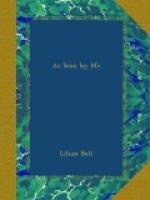To my delight the horses were wild, and stood on their hind legs and bit each other, and backed us off the road, and otherwise acted like Tartar horses in books. It seemed almost too good to be true. It was like driving through the Black Forest and seeing the gnomes and the fairies one has read about. I told my friends very humbly that I had never done anything in my life to deserve the good fortune of having those beautiful horses act in such a satisfactory and historical manner. We had to get out twice and let the idvosjik calm them down. But even when ploughing my way out of snow up to my knees I breathed an ecstatic sigh of gratitude and joy. I could not understand the men’s annoyance. It was too ideal to complain about.
We drove out to the Island for luncheon, and on the way we stopped and coasted in a curious Russian sledge from the top of a high place, something like our toboggan-slides, only this sledge was guided from behind by a peasant on skates.
A Russian meal always begins with a side-table of hors d’oeuvres, called “zakouska.” That may not be spelled right, but no Russian would correct me, because the language is phonetic, and they spell the same word in many different ways. Their alphabet has thirty-eight letters in it, besides the little marks to tell you whether to make a letter hard or soft.
Even proper names take on curious oddities of spelling, and a husband and wife or two brothers will spell their name differently when using the Latin letters. If you complain about it, and ask which is correct, they make that famous Russian reply which Bismarck once had engraved in his ring, and which he believed brought him such good luck, “Neechy voe,” “It is nothing,” or “Never mind.” You can spell with your eyes shut in Russian, and you simply cannot make a mistake, for the Russians spell with all the abandonment of French dancing.
This zakouska is so delicious and so varied and so tempting that one not accustomed to it eats too much without realizing. At a dinner an American looked at my loaded plate and said, with delicious impertinence, “Confidentially, I don’t mind telling you that dinner is coming.”
As we came back, the full delight of troika-riding came over us, for driving in the country we could not tell how fast we were going. But in town, whizzing past other carriages, hearing the shouts of the idvosjik, “Troika!” and seeing the people scatter and the sledges turn out (for a troika has the right of way), we realized at what a pace we were going. We dashed across the frozen Neva, with its tramway built right on the ice; past the Winter Palace, along the quai, where all the embassies are, into the Grand Morskaia, and from there into the Nevski, with the snow flying and our bells ringing, and the middle horse trotting and the outer horses galloping, sending clouds of steam from their heaving flanks and palpitating nostrils, and the biting air making our blood tingle, and the reiterated shout of the idvosjik, “Troika! troika!” taking our breath away.




